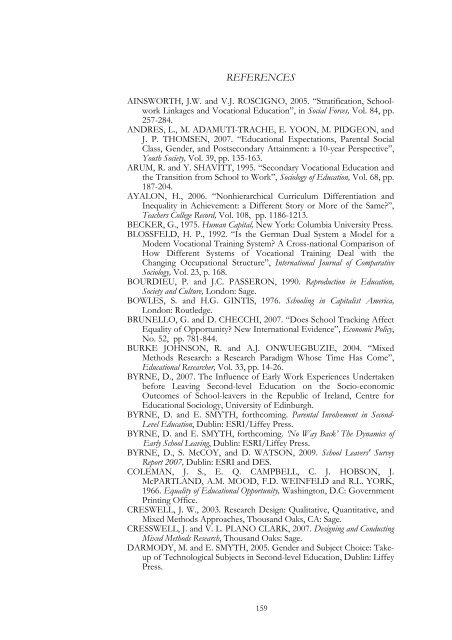Student Experiences of the Leaving Certificate Applied Programme
Student Experiences of the Leaving Certificate Applied Programme
Student Experiences of the Leaving Certificate Applied Programme
Create successful ePaper yourself
Turn your PDF publications into a flip-book with our unique Google optimized e-Paper software.
REFERENCESAINSWORTH, J.W. and V.J. ROSCIGNO, 2005. “Stratification, SchoolworkLinkages and Vocational Education”, in Social Forces, Vol. 84, pp.257-284.ANDRES, L., M. ADAMUTI-TRACHE, E. YOON, M. PIDGEON, andJ. P. THOMSEN, 2007. “Educational Expectations, Parental SocialClass, Gender, and Postsecondary Attainment: a 10-year Perspective”,Youth Society, Vol. 39, pp. 135-163.ARUM, R. and Y. SHAVITT, 1995. “Secondary Vocational Education and<strong>the</strong> Transition from School to Work”, Sociology <strong>of</strong> Education, Vol. 68, pp.187-204.AYALON, H., 2006. “Nonhierarchical Curriculum Differentiation andInequality in Achievement: a Different Story or More <strong>of</strong> <strong>the</strong> Same?”,Teachers College Record, Vol. 108, pp. 1186-1213.BECKER, G., 1975. Human Capital, New York: Columbia University Press.BLOSSFELD, H. P., 1992. “Is <strong>the</strong> German Dual System a Model for aModern Vocational Training System? A Cross-national Comparison <strong>of</strong>How Different Systems <strong>of</strong> Vocational Training Deal with <strong>the</strong>Changing Occupational Structure”, International Journal <strong>of</strong> ComparativeSociology, Vol. 23, p. 168.BOURDIEU, P. and J.C. PASSERON, 1990. Reproduction in Education,Society and Culture, London: Sage.BOWLES, S. and H.G. GINTIS, 1976. Schooling in Capitalist America,London: Routledge.BRUNELLO, G. and D. CHECCHI, 2007. “Does School Tracking AffectEquality <strong>of</strong> Opportunity? New International Evidence”, Economic Policy,No. 52, pp. 781-844.BURKE JOHNSON, R. and A.J. ONWUEGBUZIE, 2004. “MixedMethods Research: a Research Paradigm Whose Time Has Come”,Educational Researcher, Vol. 33, pp. 14-26.BYRNE, D., 2007. The Influence <strong>of</strong> Early Work <strong>Experiences</strong> Undertakenbefore <strong>Leaving</strong> Second-level Education on <strong>the</strong> Socio-economicOutcomes <strong>of</strong> School-leavers in <strong>the</strong> Republic <strong>of</strong> Ireland, Centre forEducational Sociology, University <strong>of</strong> Edinburgh.BYRNE, D. and E. SMYTH, forthcoming. Parental Involvement in Second-Level Education, Dublin: ESRI/Liffey Press.BYRNE, D. and E. SMYTH, forthcoming. ‘No Way Back’ The Dynamics <strong>of</strong>Early School <strong>Leaving</strong>, Dublin: ESRI/Liffey Press.BYRNE, D., S. McCOY, and D. WATSON, 2009. School Leavers' SurveyReport 2007, Dublin: ESRI and DES.COLEMAN, J. S., E. Q. CAMPBELL, C. J. HOBSON, J.McPARTLAND, A.M. MOOD, F.D. WEINFELD and R.L. YORK,1966. Equality <strong>of</strong> Educational Opportunity, Washington, D.C: GovernmentPrinting Office.CRESWELL, J. W., 2003. Research Design: Qualitative, Quantitative, andMixed Methods Approaches, Thousand Oaks, CA: Sage.CRESSWELL, J. and V. L. PLANO CLARK, 2007. Designing and ConductingMixed Methods Research, Thousand Oaks: Sage.DARMODY, M. and E. SMYTH, 2005. Gender and Subject Choice: Takeup<strong>of</strong> Technological Subjects in Second-level Education, Dublin: LiffeyPress.159

















